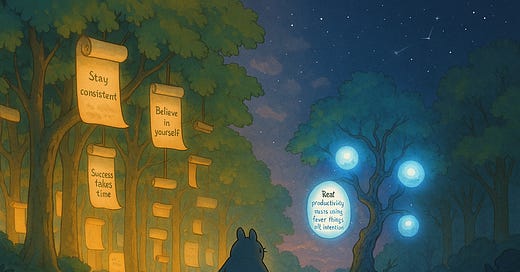To be heard, start by being relatable
To be remembered, finish by being yourself. That’s how you earn attention and trust.
👋 Hi, I’m Ritika a Marketer and the CMO at By Default. Welcome to the 72nd edition - One minute on Customer Insights.
Ever spent hours crafting a piece of content — something original, thoughtful, maybe even a little genius — only to watch it fall completely flat?
Lately, there’s been a growing buzz on LinkedIn: generic "guru-style" content seems to rank easily, but beneath the surface, it rarely converts or builds trust.
So you start questioning everything — from timing to perfecting the post — and wondering why your smartest ideas never go viral.🤔
Worse, you start holding back. You can’t even be yourself anymore — all thanks to the algorithm.👏
📌 Welcome to the paradox of content and your reader’s psychology.
1. Familiarity Beats Freshness (Most of the Time)
People often don’t resonate with uniqueness — not right away.
Not because it’s wrong. But because it’s unfamiliar.
That’s why you’ll see your unique perspective won’t get reach.
The brain is wired to take predictability and mental shortcuts. It seeks patterns it already knows. That’s why the most generic content gets the most traction:
It’s easy to digest
It requires zero effort to interpret
It feels true because it’s been heard before
This is called the "mere-exposure effect" — a psychological principle that says people tend to prefer things they've been exposed to repeatedly. Even if they’re not objectively better.
This is why:
Generic productivity hacks trend more than deep productivity philosophy.
Simple “follow your passion” messages go further than nuanced career advice.
Recycled LinkedIn posts like “I failed 3 startups before this one worked” get applause — even if you've seen that same format 100 times.
2. The Algorithm Doesn’t Reward Depth — It Rewards Ease
The sad truth?
Most social platforms are attention markets. And they optimize for:
Scroll-stopping
Share-ability
Speed of comprehension
Not nuance. Not originality. Not brilliance.
So when you drop your most thoughtful, original, insight-heavy post…
It often requires slow thinking — and most people aren’t in slow-thinking mode while scrolling.
They skip it. Not because it’s bad. But because it asks too much of them too soon.
3. Rarity Is Powerful — But Only If People Stay Long Enough to Notice
Unique insights are rare. And rarity is a double-edged sword:
Rare things are precious.
But rare things are also harder to relate to.
If your content is too unfamiliar — too nuanced, too ahead of the curve — it doesn’t feel valuable to people at first. It feels alien.
This is why new, original thinkers often feel invisible in the early days.
It’s not that you’re wrong. It’s just that you're early.
4. Lead with Familiar, Land with Fresh
If you start with only uniqueness, you lose people before they even care.
But if you start with what they already know — something relatable, obvious, or helpful — you earn the right to share your deeper truth.
Here’s the thing:
Hook them with something generic (that feels useful).
Slide in your insight as a layer underneath.
Leave them thinking something they hadn’t before.
a) James Clear (Author of Atomic Habits)
He didn’t start by sharing radical ideas about habit formation. He led with:
“Small habits make a big difference.”
“You don’t rise to the level of your goals. You fall to the level of your systems.”
These ideas feel familiar. But then he layers in research, storytelling, and unique frameworks (like the 1% rule) — and suddenly, you’re hooked.
b) Ali Abdaal (YouTuber, Author)
Starts with relatable ideas like “How I plan my week” or “Productivity tools I use.”
Then, slowly introduces deeper themes like anti-goals, creator burnout, and identity-based habits.
He earns your trust with familiarity, then offers something deeper.
Don’t Kill Your Uniqueness — Channel It Strategically
You don’t need to give up your voice to get traction. But you do need to speak the language your audience already understands — before you try to change it.
Think of it like this:
Relatability gets the click.
Originality earns the follow.
Depth builds the community.
Final Takeaway
To be heard:
Start with what people already agree with.
To be remembered: Say something that makes them rethink that agreement.
Lead with the known.
Layer in the new.
And over time, your voice becomes the bridge between what people get and what they didn’t know they needed to hear.
That’s how you earn attention and trust — even when your work isn’t made for the masses.
Thanks for reading, see you all next time!
Ritika 👋
🚨 PS…PS…
I help founders & startups turn their rare insights into relatable content — and build trust that converts & build retention. Reach out by replying to this email.📩
Want to sponsor this newsletter? Reach out by replying to this newsletter.📩
Thank you for being a consistent reader of this newsletter; it wouldn’t have reached here without your support. 🤗




Sounds good but it's something else when everyone sees my data and act blind to fax governments and everyone in power knows who i am but they choose to steal my data and go against the grain that is why I'm in every tech portfolio and I produced the bitcoin white paper 📃